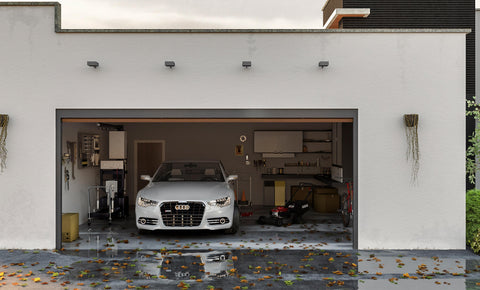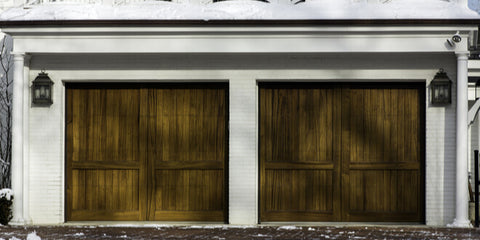Your garage door is always working, even when it’s not moving. That’s because your garage door is one of the most important structures protecting your garage from a number of threats — including water, pests and debris from outside. Your garage door stands as a guardian against the elements year-round, which means it is exposed to the most severe conditions without a break. Over time, being exposed to extreme cold in winter and extreme heat during summer can take its toll on your garage door. Additionally, it’s crucial for homeowners to understand what can happen to their garage door under those conditions. What’s more, the temperature inside your garage can vary wildly from the conditions outside, creating tension that can make the effects of extreme outdoor weather even more potent.
To help you understand how seriously heat and cold can affect your garage door, here’s what you need to know:
THE IMPACT OF COLD WEATHER ON YOUR GARAGE DOOR
Extremely cold weather can wreak havoc on your garage door’s mechanisms. The effects of winter weather can cause damage to the materials of your door over time. For example, harsh cold can cause the lubricants on the tracks of your garage door to become thick and viscous, which impacts how much work your garage door opener has to do when opening and closing it. This puts a lot of strain on the garage door, as well, and can lead to damage that will eventually require replacing the door. To prevent this from happening, it’s a good idea to make sure that your garage door tracks are lubricated with an all-weather lubricant that can stand up to the extreme cold. Make sure you apply this to your garage door tracks every time you perform regular maintenance.
Cold weather also causes your garage door’s springs to become brittle, which puts them at increased risk for failure. As metal becomes cold, it contracts to a degree. Meaning, springs that have been stiffened by the cold also may make opening and closing your garage door more difficult. Having your garage door springs properly lubricated can help prevent any damage that may happen to them in wintertime.
Outside your garage, water that pools around the base of your garage door from melting snow can freeze and press against your garage door. This not only causes your garage door to become frozen shut, but it also can damage your door.

THE IMPACT OF HOT WEATHER ON YOUR GARAGE DOOR
When the hot summer sun beats down on your garage door, bad outcomes can happen if you don’t take precautions. The summer can be especially dangerous to garage doors if there’s a high level of humidity. Because wooden garage doors can absorb a lot of moisture during humid weather. This excess moisture can cause wood to swell. Thus, your garage door will be at risk of cracking or splitting. Additionally, wooden garage doors that soak up water in humid conditions are at risk of accelerated rotting.
That’s why it’s important to apply a coat of finish or protective paint to your wooden garage door before summer’s humidity has a chance to affect it. For doors that are already painted, a top coat of automotive wax will provide a layer of protection and keep your garage door looking shiny and new for longer. For doors that are stained, you’ll need to apply a coat of polyurethane finish every two years to get the most protection for your garage door.
Something else to watch for in summer is glare from the sun affecting your garage door’s sensors. If your garage door has an electronic eye that prevents it from closing if something is underneath it, glare from the sun may interfere with it and prevent your garage door from closing — even if it’s all clear underneath. If this becomes a problem, shading the electronic eye with cardboard or another opaque flexible material might be necessary.
Remember, if you’re not careful, extreme heat or cold could cause serious damage to your garage door and age it prematurely. Follow these steps, and your garage door — working together with a garage door threshold seal — can continue to protect your garage and everything in it for a long time to come.

